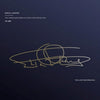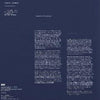







Erroll Garner - The Unreleased Berlin Studio Recording 1967 (45RPM)
ORDER LIMITED TO ONE ITEM PER CUSTOMER
Erroll Garner, Piano
Jose Mangual, Bongos
Ike Isaacs, Bass
Jimmie Smith, Drums
Written by Joseph Kosma (A1), Jack Strachey (A2), Johnny Mandel (A3), Erroll Garner (B1-2), Richard Rodgers (B3), Ralph Rainger (B4)
1 LP, gatefold jacket printed in Italy including a limited time 16-bit album download card
Limited to 3,000 numbered copies
Original analog Master tape : YES
Heavy Press : 180g
Record color : black
Speed : 33RPM
Size : 12'’
Stereo
Studio
Record Press : Marciac Workshop Pressings, France
Label : The Lost Recordings
Original label : The Lost Recordings
Recorded November 2, 1967 at RBB Studio III, Berlin
Remastered by The Lost Recordings
Lacquer cut by Kevin Gray at Cohearent Audio
Originally released in March 2023
Tracks:
Side A
- Autumn Leaves
- These Foolish Things
- The Shadow of Your Smile
Side B
- Like It Is
- Misty
- Blue Moon
- Thanks for the Memory
Reviews :
Erroll Garner was revered by both his peers, who ranked him among the foremost of the purest, most spontaneous geniuses that jazz has ever given us, and the general public, who intuitively recognized him as one of the magicians of the golden age, along with Duke Ellington, Count Basie and Ella Fitzgerald, whose gifts could transform the suffering and humiliation of Afro-American life into the rhythm and outpouring of joy rather than anger and resentment. Forty-five years after his death, Garner, with his dazzling style that made such a radical break from existing trends, remains an enigma in the history of twentieth-century popular music. He is still unique and cannot be pinned down.
Garner was born in Pittsburgh, Pennsylvania in 1921. It was the birthplace of a slew of major pianists, including Earl Hines, Ahmad Jamal and Billy Strayhorn, each of whom profoundly influenced the aesthetic directions taken by classical jazz. Entirely self-taught and gifted with an extraordinary ear, Garner created a style all of his own very early on, synthesizing the contributions of the masters of stride piano (James P. Johnson, Fats Waller) and of the swing period (Earl Hines, Art Tatum). Yet he remained so attuned to the evolution of modernity that in 1947, hardly had he settled in New York than the king of bebop, Charlie Parker, personally invited him to join in a session. The performance has since become a legend.
Influenced by the tradition of the big swing bands and basing his improvisations chiefly on the melody, Garner liked to use the keyboard as if it were an orchestra. He always retained his distance with the intellectualism and formalism of bebop. Concentrating on his own work, he preferred to keep to the sidelines of the turbulent musical changes of the time, finessing his atypical yet timeless art of the trio that culminated with the worldwide success of his live album “Concert by the Sea” in 1955.
Only a few weeks before this innovative album was recorded, Garner was in a Berlin recording studio at the helm of his new group comprising Ike Isaaks on bass, Jimmy Smith on drums and Jose Mangual on bongos for a brief, inspired session that somehow remained unpublished until today. In a laid-back atmosphere, they play an entrancing yet familiar repertoire of both timeless standards (Autumn Leaves, The Shadow of Your Smile, Blue Moon and These Foolish Things) and two original themes, including his favourite composition, Misty. The pianist is superbly accompanied by a rhythmic section that is elegant, minimalist and effervescent, and delivers the simple quintessence of his poetry almost as if by accident. Garner, his all-time signature an unmatched sense of ease, delivers his fluid, light style rich in new motifs, new phrases and digressions. He displays his gift of constantly reinventing the music in the present moment; the spontaneity is unreserved. The melodies are bewitching, the rhythms unbridled, and the baroque ornamentations flow from his piano as if it were a bottomless cornucopia. Today there is no equivalent to this music, imbued with joie de vivre whose exuberance often resonates with paradoxical modesty and refinement.
These tapes, rescued from oblivion and immortalizing Garner’s supreme talent, make an indispensable addition to every jazz lover’s library.




